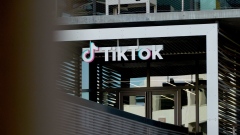Jun 16, 2024
Le Pen Says She’s Ready to Work Alongside Macron in France
, Bloomberg News

(Bloomberg) -- Far-right leader Marine Le Pen said she won’t try to push out President Emmanuel Macron if she wins France’s snap parliamentary election in an appeal to moderates and investors.
“I’m respectful of institutions, and I’m not calling for institutional chaos,” Le Pen told Le Figaro newspaper. “There will simply be cohabitation.”
Le Pen is reaching out to mainstream voters as she aims to cement a majority in the next parliament, a result that would constitute an earthquake in European politics. Her group, the National Rally, is already on track to become the biggest party in the lower house, a prospect which has caused alarm among investors, France’s international partners and a section of the French public.
Tens of thousands of protesters took to the streets across France on Saturday to oppose Le Pen’s stance on human rights, the environment and the economy. Financial markets have also tumbled since Macron dissolved the National Assembly a week ago, with about $210 billion wiped off the value of French stocks.
“The chaos is him,” she told Le Figaro. “Social chaos, chaos on security issues, chaos with migration, and now, institutional chaos.”
The National Rally is on track to win 35% of the vote in the first round on June 30, according to an Ifop poll published Sunday in Le Journal Du Dimanche. The left-wing Popular Front would come second with 26% while Macron’s Renaissance was third at 19%. Those projections are broadly in line with a previous survey conducted Monday and Tuesday.
Le Pen said that if she can form a majority — either with National Rally lawmakers alone, or with allies — she would lead her group’s parliamentary caucus and 28-year-old party leader Jordan Bardella will become prime-minister. The two-round election concludes on July 7.
Beyond the general sense of alarm surrounding a politician who once supported Vladimir Putin and campaigned for France to leave the euro, investors’ concerns about Le Pen focus on three areas: Ukraine, the European Union and, most of all, the budget.
France’s constitutional structure means that sometimes the presidency and the legislature can be controlled by different parties, although it’s happened less frequently than in the US. The last time was in 1997.
In that situation, the president is responsible for foreign policy and defense, but it’s the prime minister who controls domestic issues such as fiscal policy.
Even under Macron, who’s made budget restraint part of his pitch to voters, France has been backsliding on a pledge made earlier this year to cut the budget deficit and investors worry that the situation could deteriorate rapidly under a populist government run by Le Pen and Bardella.
The National Rally hasn’t yet set out its policy proposals in detail but it has said it would slash sales taxes on fuel and energy at a cost of about €20 billion ($21 billion) and pledged to take back control of energy policy from the EU. It has also promised to lower the retirement age to 60 and increase wages for some public servants.
“Financial markets don’t really understand the National Rally’s project,” Le Pen told Le Figaro. “They have only heard the caricature of our project. When they read about it, they find it rather reasonable.”
Bank of France Governor Francois Villeroy de Galhau said Wednesday the next government must quickly clarify its economic policy while Finance Minister Bruno Le Maire, a close ally of Macron, warned that a Le Pen victory would trigger a financial crisis in France.
Le Pen’s Pivot
Le Pen has spent years trying to soften the image of her movement, which was founded by her father, a holocaust denier and anti-semite.
All the same, in the presidential election of 2022, she proposed a crackdown on immigration that would have involved expelling undocumented migrants. Bardella has portrayed immigration from Africa as a threat to French culture and has at times endorsed the “great replacement” conspiracy theory, which says that White, Christian Europeans are being supplanted by Muslim or non-Western migrants.
On Russia, Le Pen has tried to recalibrate her position as the war in Ukraine transformed public perceptions of Putin. She has praised the “heroic resistance” of the Ukrainian people but she’s also criticized international sanctions on Russia and the National Rally abstained in a vote earlier this year on providing security guarantees to Kyiv.
(Updates with latest polls in fifth paragraph)
©2024 Bloomberg L.P.







